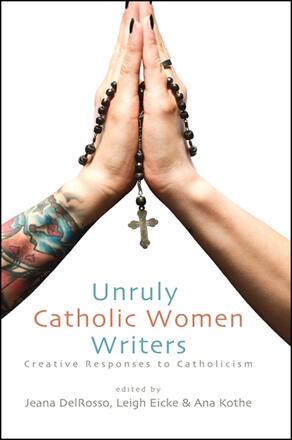
Unruly Catholic Women Writers
Creative Responses to Catholicism
Alternative formats available from:
A literary anthology exploring contemporary Catholic women’s experiences.
Description
Finalist for the 2013 ForeWord IndieFab Book of the Year Award in the Anthologies Category
This unique literary anthology is devoted to unruly Catholic women. In short stories, poems, personal essays, and drama, the contributors describe women's struggles with Catholicism and also complicate contemporary understandings of women's relationships to their faith. Catholicism often oppresses the women in these creative pieces, but it also inspires them to challenge literary, social, political, and religious hierarchies. The collection reflects the considerations of a wide range of women from a variety of ethnic backgrounds, geographic locations, and generations; they encompass the gamut of reactions to the Catholic experience—humor, anger, nostalgia, critique, appreciation, and engagement or rejection on one's own terms. Authors address real life versus Catholic dogma, motherhood, childhood, alienation from the Church, Catholic school days, mentors and exemplary figures, Church strictures on women's sexualities, and leaving or remaining in the Church among many other experiences. Readers will find this a rich and multifaceted exploration, one that offers new perspectives and moments of recognition.
Jeana DelRosso is Professor of English and Women's Studies and Director of the Morrissy Honors Program at Notre Dame of Maryland University. She is the coeditor (with Leigh Eicke and Ana Kothe) of The Catholic Church and Unruly Women Writers: Critical Essays. Leigh Eicke is a writer and independent scholar in Grand Rapids, Michigan. Ana Kothe is Professor of Comparative Literature at the University of Puerto Rico, Mayagüez.
Reviews
"Whatever a reader's beliefs, opinions, attitudes, or hopes and dreams about women and Catholicism, this book will open up new vistas. It may provoke taking sides, making a decision at last, or coming to appreciate certain viewpoints. Reading some or all of the pieces will assuredly create a response in the reader. " — American Catholic Studies
"Catholic school features prominently in this collection, as you might expect, and the majority of the stories, essays, and poems use this fertile ground very well … it is not mere rejection of an ancient patriarchal society that drives this anthology. Rather, these are the stories, the songs, the prayers, of children who long to forgive, to see their broken home repaired, to come home. " — San Francisco Book Review
"There are pieces in this anthology that perfectly capture the paradox of distaste and desire … Readers who wish to find critiques of the Church will find their red meat in Unruly Catholic Women Writers, but so will readers who desire more sustained considerations of an imperfect Church that houses a faith that has consoled and cared for so many, women and men alike. " — Marginalia Review of Books
"Conveying a range of feelings from anger to appreciation, the confessional expressions and recollections gathered together in Unruly Catholic Women offer a versatile, entirely feminist view of the Roman Catholic experience. " — Kathleen Gerard, blogger at Reading Between the Lines
"These are honest and poignant writings by women who refuse to be bound by Catholicism's strictures, even while acknowledging what contributor Madeleine Mysko calls, 'a peculiar feeling in my chest, a heaviness reminiscent of homesickness, though I cannot say for what. ' Included are schoolgirls slipping pictures of the Beatles between holy cards of martyred virgins, a group of friends planning racy confessions to a heartthrob priest, a woman wearing a purple halter top at the Vatican, a wedding video viewed on rewind, an artist's model contemplating the body, and a woman considering the weight and beauty of her First Communion dress as it settles into her hands. A rich and varied collection. " — Sonja Livingston, author of Ghostbread
"The authors of this inspired anthology give voice to the complexity and nuance of Catholic women's experience. For all the Church has done to suppress women, this anthology doesn't simply talk back, but by speaking truth to experience, in writing that is perceptive, wise, and sometimes humorous, it transforms experience. These authors—unruly—and otherwise, take the good the faith has offered them—from a reverence for mystery to the recognition of the power of ritual—and triumph, claiming the right to truth on their own terms. " — Patrice Vecchione, author of Writing and the Spiritual Life: Finding Your Voice by Looking Within